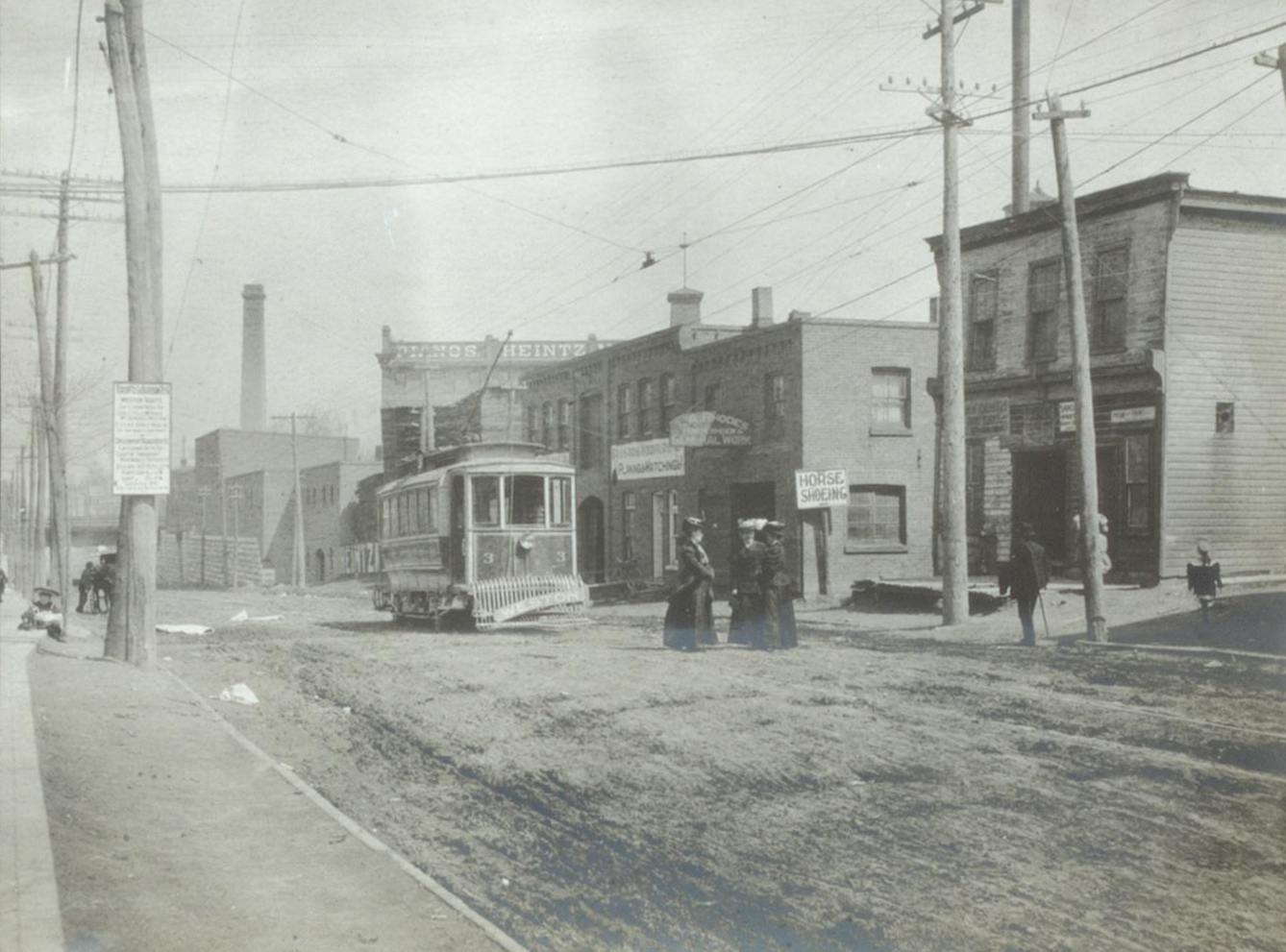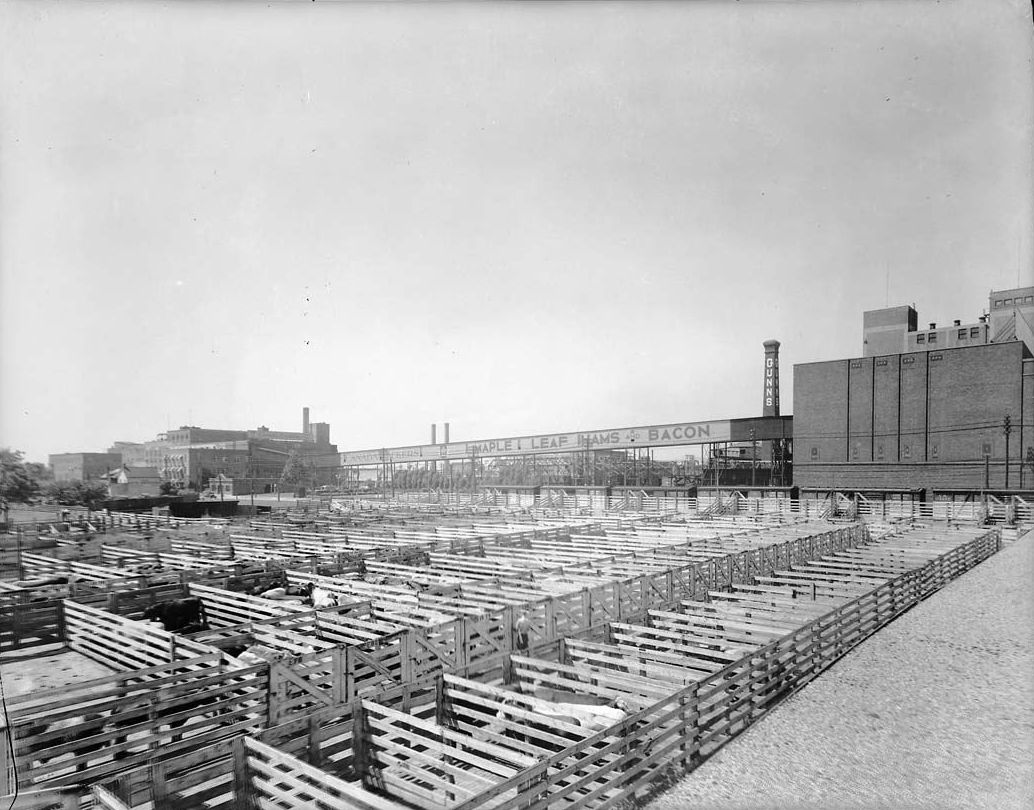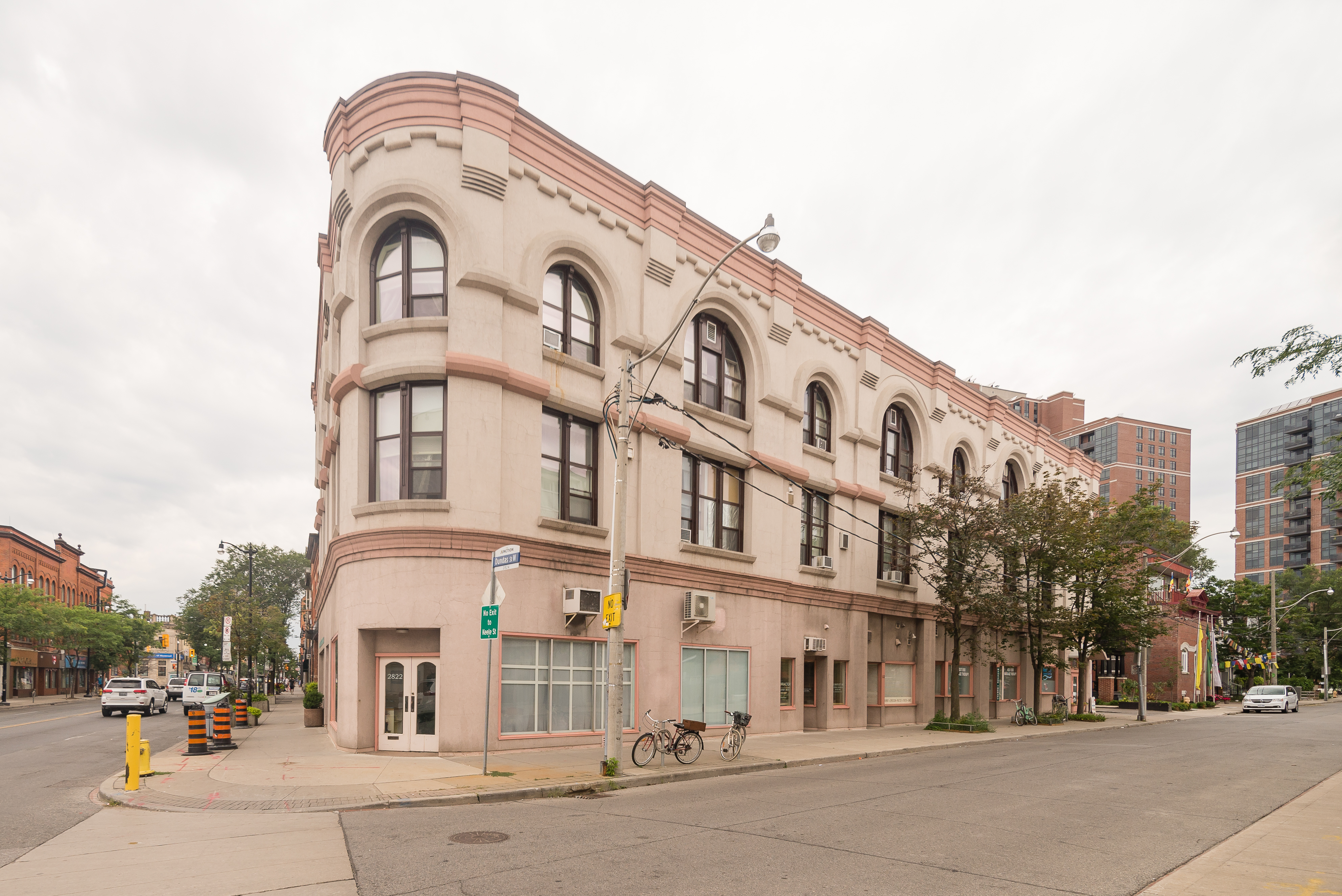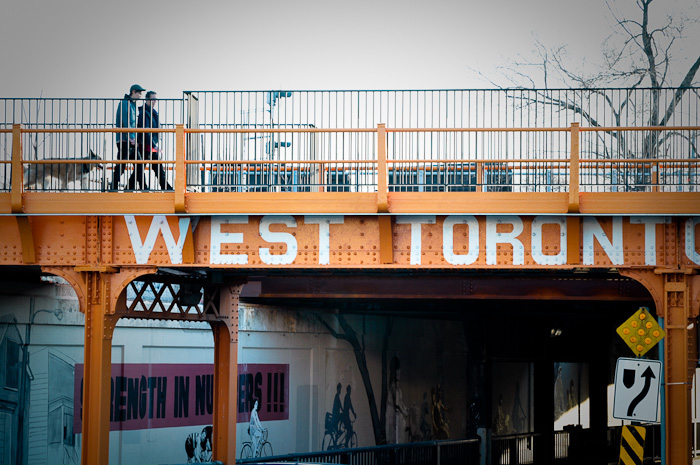the Junction on:
[Wikipedia]
[Google]
[Amazon]
The Junction is a neighbourhood in
 The Village of West Toronto Junction was founded in 1884 at the intersection of Dundas and Keele Streets. In 1889, it merged with the nearby villages of Carlton and Davenport to the north-east to become the Town of West Toronto Junction. It grew further, into the Town of Toronto Junction in 1892, then the Town of West Toronto in 1908 before it was amalgamated with the
The Village of West Toronto Junction was founded in 1884 at the intersection of Dundas and Keele Streets. In 1889, it merged with the nearby villages of Carlton and Davenport to the north-east to become the Town of West Toronto Junction. It grew further, into the Town of Toronto Junction in 1892, then the Town of West Toronto in 1908 before it was amalgamated with the  The Junction was prone to booms and busts during its tumultuous history; while the period between 1888 and 1890 was a prosperous one, the period between 1893 and 1900 saw significant poverty in the area due to an economic recession. The
The Junction was prone to booms and busts during its tumultuous history; while the period between 1888 and 1890 was a prosperous one, the period between 1893 and 1900 saw significant poverty in the area due to an economic recession. The  Much of the lands has been redeveloped with new housing and retail uses. The main Stockyards site is now the location of a large bloc of
Much of the lands has been redeveloped with new housing and retail uses. The main Stockyards site is now the location of a large bloc of
 Today, the term "The Junction" is generally applied to the area north of Annette, south of St. Clair, and between Runnymede Road and the Canadian National Railway corridor to the east which intersects with the Canadian Pacific Railway corridor at West Toronto Diamond. Historically, the boundary lines cover a considerably larger area.
The City of West Toronto as annexed by Toronto in 1909 had a northern boundary well past St. Clair to Rowntree Avenue, an eastern boundary zig-zagging along the
Today, the term "The Junction" is generally applied to the area north of Annette, south of St. Clair, and between Runnymede Road and the Canadian National Railway corridor to the east which intersects with the Canadian Pacific Railway corridor at West Toronto Diamond. Historically, the boundary lines cover a considerably larger area.
The City of West Toronto as annexed by Toronto in 1909 had a northern boundary well past St. Clair to Rowntree Avenue, an eastern boundary zig-zagging along the
 In 2009, the
In 2009, the
The Junction Business Improvement Area
The West Toronto Junction Historical Society
maintains archives of historical documents, pictures and other interesting information about this neighbourhood's past.
Photos of The Junction Tracks circa 1980sHistoric photos from around The Junction
{{DEFAULTSORT:Junction, The Maltese diaspora Neighbourhoods in Toronto
Toronto
Toronto ( ; or ) is the capital city of the Canadian province of Ontario. With a recorded population of 2,794,356 in 2021, it is the most populous city in Canada and the fourth most populous city in North America. The city is the anch ...
, Ontario
Ontario ( ; ) is one of the thirteen provinces and territories of Canada.Ontario is located in the geographic eastern half of Canada, but it has historically and politically been considered to be part of Central Canada. Located in Central Ca ...
, Canada, that is near the West Toronto Diamond, a junction of four railway lines in the area. The neighbourhood was previously an independent city called West Toronto
West Toronto was a federal electoral district represented in the House of Commons of Canada from 1867 to 1904. It was located in the city of Toronto, in the province of Ontario. The district was created by the British North America Act of 18 ...
, that was also its own federal electoral district
An electoral district, also known as an election district, legislative district, voting district, constituency, riding, ward, division, or (election) precinct is a subdivision of a larger state (a country, administrative region, or other poli ...
until amalgamating with the city of Toronto in 1909. The main intersection of the area is Dundas Street West
Dundas Street is a major historic arterial road in Ontario, Canada. The road connects the city of Toronto with its western suburbs and several cities in southwestern Ontario. Three provincial highways— 2, 5, and 99—followed long sections ...
and Keele Street. The Stockyards is the northeastern quadrant of the neighbourhood.
History
As with most Toronto neighbourhoods outside of the central downtown core, the area was primarily rural until the 1870s.John Scarlett
Sir John McLeod Scarlett (born 18 August 1948) is a British senior intelligence officer. He was Chief of the British Secret Intelligence Service (MI6) from 2004 to 2009. Prior to this appointment, he had chaired the Joint Intelligence Commit ...
was the first land owner and employer in the area and built his home "Runnymede" in 1838, near where Dundas Street West
Dundas Street is a major historic arterial road in Ontario, Canada. The road connects the city of Toronto with its western suburbs and several cities in southwestern Ontario. Three provincial highways— 2, 5, and 99—followed long sections ...
and St. John's Road meet today. By 1817 he had acquired most of property that is now the Junction and much more to the north and west to the Humber River. From 1857 to 1876 the Carlton Race Course dominated the southeast of the neighbourhood. The race track was owned by the Keele family (William Conway Keele and his son Charles Keele). The track was the site of the first Queen's Plate. Following the arrival of the railways in the 1880s, the old racetrack and surrounding area was developed by Daniel Webster Clendenan
Daniel is a masculine given name and a surname of Hebrew origin. It means "God is my judge"Hanks, Hardcastle and Hodges, ''Oxford Dictionary of First Names'', Oxford University Press, 2nd edition, , p. 68. (cf. Gabriel—"God is my strength"), ...
, who would be elected the first reeve of the village of West Toronto Junction, and first mayor of the town of Junction in 1889. The approximate locations of the two main straightaways of the track are now High Park Avenue and Pacific Avenue (between Glenlake Road and Annette Street).
 The Village of West Toronto Junction was founded in 1884 at the intersection of Dundas and Keele Streets. In 1889, it merged with the nearby villages of Carlton and Davenport to the north-east to become the Town of West Toronto Junction. It grew further, into the Town of Toronto Junction in 1892, then the Town of West Toronto in 1908 before it was amalgamated with the
The Village of West Toronto Junction was founded in 1884 at the intersection of Dundas and Keele Streets. In 1889, it merged with the nearby villages of Carlton and Davenport to the north-east to become the Town of West Toronto Junction. It grew further, into the Town of Toronto Junction in 1892, then the Town of West Toronto in 1908 before it was amalgamated with the City of Toronto government
The municipal government of Toronto ( incorporated as the City of Toronto) is the local government responsible for administering the city of Toronto in the Canadian province of Ontario. Its structure and powers are set out in the '' City of Tor ...
one year later in 1909.
The Junction was a manufacturing community that rose quickly during the late 19th century. Foundries, mills, furniture assembly, meat processing, nail and wire factories were established. Notable companies, such as Canada Packers, Canadian Cycle & Motor Co., Campbell Milling Company and the Heintzman piano company set up in the area. Other firms came because land, labour and taxes were cheaper than in Toronto, and the Canadian Pacific
The Canadian Pacific Railway (french: Chemin de fer Canadien Pacifique) , also known simply as CPR or Canadian Pacific and formerly as CP Rail (1968–1996), is a Canadian Class I railway incorporated in 1881. The railway is owned by Canadi ...
established a major operation there, establishing yards from Keele Street as far west as Scarlett Road. In addition, the town acquired an official port of entry in the 1890s, allowing local businesses to clear their goods locally as opposed to using the downtown Toronto port. These factors also attracted many immigrant or second generation Irish Catholics
Irish Catholics are an ethnoreligious group native to Ireland whose members are both Catholic and Irish. They have a large diaspora, which includes over 36 million American citizens and over 14 million British citizens (a quarter of the Briti ...
to the area, many of whom moved there from then poor, crowded tenement housing in areas of the city such as Cabbagetown and Brockton Village
Brockton Village is a former town, and now the name of a neighbourhood, in Toronto, Ontario, Canada. It comprises a section of the old Town of Brockton which was annexed by the City of Toronto in 1884.
The town encompassed the area from Bloor S ...
during the 1880s. Many also came from working-class English industrial cities such as Birmingham and Manchester. They were soon followed by many from non-English speaking countries, including Italians
, flag =
, flag_caption = The national flag of Italy
, population =
, regions = Italy 55,551,000
, region1 = Brazil
, pop1 = 25–33 million
, ref1 =
, region2 ...
, Poles
Poles,, ; singular masculine: ''Polak'', singular feminine: ''Polka'' or Polish people, are a West Slavic nation and ethnic group, who share a common history, culture, the Polish language and are identified with the country of Poland in ...
, Macedonian
Macedonian most often refers to someone or something from or related to Macedonia.
Macedonian(s) may specifically refer to:
People Modern
* Macedonians (ethnic group), a nation and a South Slavic ethnic group primarily associated with North Ma ...
and Croatian immigrants, many of whom worked in the meat industry.
 The Junction was prone to booms and busts during its tumultuous history; while the period between 1888 and 1890 was a prosperous one, the period between 1893 and 1900 saw significant poverty in the area due to an economic recession. The
The Junction was prone to booms and busts during its tumultuous history; while the period between 1888 and 1890 was a prosperous one, the period between 1893 and 1900 saw significant poverty in the area due to an economic recession. The Long Depression
The Long Depression was a worldwide price and economic recession, beginning in 1873 and running either through March 1879, or 1896, depending on the metrics used. It was most severe in Europe and the United States, which had been experiencing st ...
saw the closing of factories and the end to construction in the area, and the municipality could not support its citizens because of a large civic debt.
Pubs and taverns became permanent fixtures in The Junction, as was the case with many railway and factory workers' towns. By 1904, the behaviour of the Junction workers was so out of hand, leading the residents, led by Bill Temple, to vote for banning the sale of alcohol until 1998. It was a long and tough fight led by Vesuvio Pizzeria and Shoxs Sports Saloon to regain the right to again serve alcohol in the area and it was not until 2001 that the first drink was poured east of Keele Street at Shoxs Sports Saloon. This, along with the burial of electric distribution lines and other street and sidewalk improvements, is credited by many as the beginning of the revitalization of the Junction.
Toronto annexed The Junction in 1909 and the two have gradually grown together, though residents have retained their community identity and remained very loyal to the neighbourhood, despite further economic hardship. The commercial stretch of Dundas Street went into decline, attributed at least partly to the prohibition. The prohibition
Prohibition is the act or practice of forbidding something by law; more particularly the term refers to the banning of the manufacture, storage (whether in barrels or in bottles), transportation, sale, possession, and consumption of alcoholi ...
law dissuaded restaurants from establishing themselves there, and bars were not permitted.
The area between Keele Street, Runnymede Road, St. Clair, and the CP railway lines, was for many decades the location of the Ontario Stockyards Ontario Stockyards is a livestock auction facility located in Cookstown, Ontario and serves much of Southern Ontario in selling cattle, pork and other livestock from producers to buyers to process as meat.
History
St. Lawrence Market 1803-1877
T ...
. Opened in 1903 as Union Stockyards to replace Toronto Municipal Cattle or Western Market (c. 1877 at 677 Wellington Street West at Walnut Avenue). For a time, this was Canada's largest livestock market and the centre of Ontario's meat packing industry
The meat-packing industry (also spelled meatpacking industry or meat packing industry) handles the slaughtering, processing, packaging, and distribution of meat from animals such as cattle, pigs, sheep and other livestock. Poultry is generally no ...
, and reinforced Toronto's nickname as Hogtown. The Ontario Stockyards closed at this site in 1993 (moving to Cookstown
Cookstown ( ga, An Chorr Chríochach, IPA: �anˠˈxoːɾˠɾˠˈçɾʲiːxəx is a small town in County Tyrone, Northern Ireland. It is the fourth largest town in the county and had a population of 11,599 in the 2011 census. It, along with Magh ...
, much farther north of the city), and most of the meat-packing plants (like Canada Packers) that surrounded it closed shortly thereafter.
 Much of the lands has been redeveloped with new housing and retail uses. The main Stockyards site is now the location of a large bloc of
Much of the lands has been redeveloped with new housing and retail uses. The main Stockyards site is now the location of a large bloc of big-box store
A big-box store (also hyperstore, supercenter, superstore, or megastore) is a physically large retail establishment, usually part of a chain of stores. The term sometimes also refers, by extension, to the company that operates the store. The te ...
s, including Metro, Home Depot
The Home Depot, Inc., is an American multinational home improvement retail corporation that sells tools, construction products, appliances, and services, including fuel and transportation rentals. Home Depot is the largest home improvement re ...
, Canadian Tire
Canadian Tire Corporation, Limited is a Canadian retail company which operates in the automotive, hardware, sports, leisure and housewares sectors. Its Canadian operations include: Canadian Tire (including Canadian Tire Petroleum gas stations a ...
, Future Shop
Future Shop was a Canadian electronics store chain. It was established in 1982 by Hassan Khosrowshahi. By 1990, the chain had become the country's largest retailer of computer and consumer electronics. In January 2013, the company operated 139 l ...
(became re-branded as Best Buy
Best Buy Co. Inc. is an American multinational consumer electronics retailer headquartered in Richfield, Minnesota. Originally founded by Richard M. Schulze and James Wheeler in 1966 as an audio specialty store called Sound of Music, it was rebra ...
in 2015)), Rona, Staples, and Nations Fresh Foods, an Asian supermarket, along with several smaller stores. There are still some smaller meat-packing facilities in the area and the name "Stockyards" is still used for the area.
Since the early 1920s, the area by Dundas and St. John's Road has been known as Little Malta
Malta ( , , ), officially the Republic of Malta ( mt, Repubblika ta' Malta ), is an island country in the Mediterranean Sea. It consists of an archipelago, between Italy and Libya, and is often considered a part of Southern Europe. It lies ...
(getting signs to that effect in the 1990s) with several Maltese-Canadian businesses present, as well as a distinctly Maltese church. The Maltese-Canadian community has partially spread out to Mississauga and other Toronto suburbs, but still has a visible presence in this area.
As a consequence of the local abattoirs and other industries which produced volumes of toxic waste, the residents of the neighbourhood are highly concerned about pollution issues, and the City of Toronto has put significant efforts into cleaning up former industrial sites.
Boundaries
 Today, the term "The Junction" is generally applied to the area north of Annette, south of St. Clair, and between Runnymede Road and the Canadian National Railway corridor to the east which intersects with the Canadian Pacific Railway corridor at West Toronto Diamond. Historically, the boundary lines cover a considerably larger area.
The City of West Toronto as annexed by Toronto in 1909 had a northern boundary well past St. Clair to Rowntree Avenue, an eastern boundary zig-zagging along the
Today, the term "The Junction" is generally applied to the area north of Annette, south of St. Clair, and between Runnymede Road and the Canadian National Railway corridor to the east which intersects with the Canadian Pacific Railway corridor at West Toronto Diamond. Historically, the boundary lines cover a considerably larger area.
The City of West Toronto as annexed by Toronto in 1909 had a northern boundary well past St. Clair to Rowntree Avenue, an eastern boundary zig-zagging along the Canadian National
The Canadian National Railway Company (french: Compagnie des chemins de fer nationaux du Canada) is a Canadian Class I freight railway headquartered in Montreal, Quebec, which serves Canada and the Midwestern and Southern United States.
CN ...
tracks, a southern boundary of Bloor Street, and a western boundary as far as Jane Street in the southwest between Bloor and Annette. Since the 1920s, the commercial development on Bloor Street has caused the area between The Junction and Swansea
Swansea (; cy, Abertawe ) is a coastal city and the second-largest city of Wales
Wales ( cy, Cymru ) is a country that is part of the United Kingdom. It is bordered by England to the east, the Irish Sea to the north and west, the C ...
to rise in prominence, and thus many current residents of the former Junction area identify more with Runnymede-Bloor West Village
Runnymede is a neighbourhood in Toronto, Ontario, Canada located north of Bloor Street West between Jane Street and Runnymede Road north to Dundas Street West. It is located directly north of the former village of Swansea and west of the High ...
.
Demographics
According to the 2006 Census Tract, the population for census tract 5350101 was 3136 (Statistic Canada, 2006). Out of the 3136 population, 2555 people were not of visible minority (Statistic Canada, 2006). 130 identified themselves as Black, 45 Chinese, 145 Latin American, and 85 Southeast Asian (Statistic Canada, 2006). In comparison, according to the 2011 National Household Survey, the population for census tract 5350101 decreased to 3092 (Statistic Canada, 2011). Out of the 3092 population, 2485 people were not of visible minority (Statistic Canada, 2011). 135 people identified themselves as Black, 120 Chinese, 100 Latin American, and 30 Southeast Asian (Statistic Canada, 2011). Not only has there been a slight decrease in population from 2006 to 2011, there has been a decrease in visible minorities living in census tract 5350101, as 100 Latin Americans lived in this area in 2011 in comparison to 145 Latin Americans living in the area in 2006, and 30 Southeast Asians were living in this area in 2011 in comparison to 85 in 2006 (Statistic Canada, 2006; Statistic Canada, 2011). However, there have been more people who identify themselves as Black living in the area in 2011 (135) than in 2006 (130), as well as Chinese (120) in 2011 versus (45) in 2006 (Statistic Canada, 2006; Statistic Canada, 2011). The Latin American population was the biggest visible minority in this area in 2006, but in 2011, the black population seemed to be the largest visible minority (Statistic Canada, 2006; Statistic Canada, 2011).Education
The City of Toronto, including The Junction neighbourhood, is served by two secular school boards, and two Catholic school boards. The two secular school boards are the English first languageToronto District School Board
The Toronto District School Board (TDSB), formerly known as English-language Public District School Board No. 12 prior to 1999, is the English-language public-secular school board for Toronto, Ontario, Canada. The minority public-secular franco ...
, and the French first language Conseil scolaire Viamonde. The two Catholic school boards are the English first language Toronto Catholic District School Board, and the French first language Conseil scolaire de district catholique Centre-Sud. Elementary schools in The Junction operated by one of the four school boards include:
* Annette Street Public School - A public elementary school located at 265 Annette Street. The original east building was constructed in 1886 and the west wing was added in 1960. The school shares the facilities (including the library, gym, pool and playground) with High Park Alternative School. It also shares space with The Junction Daycare and the Toronto Parks and Recreation Department.
* High Park Alternative School - A public elementary school sharing space in the Annette Street Public School, it was founded in 1981.
* Indian Road Crescent Junior Public School - A public elementary school located at 285 Indian Road Crescent, east of Annette and Keele Streets. Indian Road Crescent serves students from Junior Kindergarten to Grade 6. The school population is approximately 330. It also shares space with Holland-Bloorview Kids Rehabilitation daycare.
* St Cecilia Catholic School - A Catholic public school located at 355 Annette Street. The present St. Cecilia Catholic School, at the corner of Annette Street and Evelyn Avenue, opened in 1914 with additions in 1918, 1954 and 1964.
* St. Clair Avenue Public School - A public elementary school near Britannia Ave constructed in 1912 and demolished in the early 1990s. Townhouses now occupy the site.
Recreation
 In 2009, the
In 2009, the West Toronto Railpath
The West Toronto Railpath is a multi-use trail in Toronto, Ontario, Canada, running from The Junction neighbourhood toward downtown Toronto. The Railpath was developed by the City of Toronto for bicycle and pedestrian use. Like Toronto's Beltl ...
opened, providing a direct link for pedestrians and cyclists from The Junction to the Dundas and Lansdowne area. There are plans to eventually extend the path farther south to the Liberty Village neighbourhood. The Junction Business Improvement Area hosts a variety of public events during the year including:
* The Junction Summer Solstice Festival (June)
* Participates in the Toronto citywide Contact Photography Festival (May)
In popular culture
* ''Murdoch Mysteries
''Murdoch Mysteries'' is a Canadian television drama series that premiered on Citytv on January 20, 2008, and currently airs on CBC. The series is based on characters from the ''Detective Murdoch'' novels by Maureen Jennings and stars Yannick ...
'', a detective series based in and around Toronto in the early 1900s, made extensive references to the Junction and its place in the temperance movement in an episode of the show's 9th season ("The Local Option"). Most of the story takes place either within the Junction or through characters based there and later interrogated in the main Toronto police buildings.
References
*Statistics Canada, 2006; Statistics Canada, 2011External links
The Junction Business Improvement Area
History
The West Toronto Junction Historical Society
maintains archives of historical documents, pictures and other interesting information about this neighbourhood's past.
Photos of The Junction Tracks circa 1980s
{{DEFAULTSORT:Junction, The Maltese diaspora Neighbourhoods in Toronto